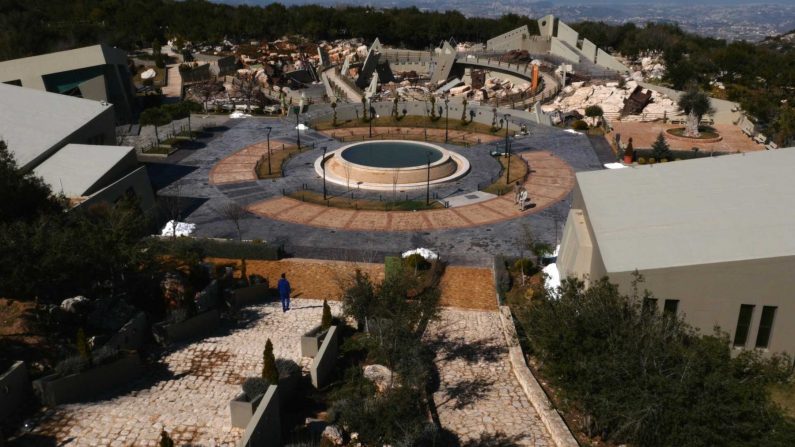
Sandra Schäfer, Mleeta, Zweikanal-Videoinstallation, 12′, Deutschland 2016, Farbe, Arabisch mit englischen UT, Videostill
Tuesday, 25 October 2016, 6 pm
To inhabit spaces of resistance – Film Screening and Artist Talk
Sandra Schäfer discusses her work with Walid el Houri
Sandra Schäfer’s current artistic work focuses on the visual policy of the post-war architecture in Lebanon. In so doing she deals with two projects of the Hezbollah: the ‚Museum of Resistance‘ in South Lebanon Mleeta and the reconstruction of the district Haret Hreik.
On a mountain in Southern Lebanon that was once a Hezbollah safe haven, Hezbollah built the Museum of Resistance, a propagandistic re-enactment that reproduces scenic and military scenarios. The district Haret Hreik that houses the headquarters and supporter base of the Hezbollah, was destroyed by the Israeli army in 2006 and was rebuilt by Hezbollah.
Both projects are part of a military conflict and a geopolitical framework in which architecture and museum scenarios are part of the production of space, landscape and memory.
One of the core questions in Sandra Schäfer’s work is how the interpretation of resistance by Hezbollah becomes a dominant project and how this manifests itself spatially. Together with researcher and filmmaker Walid el Houri the artist Sandra Schäfer will present parts from her work in an open conversation.
Sandra Schäfer deals in her work with the production processes of urban and transgeographic spaces, history, and visual policies. Frequently her works emerge out of research, in which she is engaged with processes of dealing with documents, pictures, and spatial narratives. Exhibitions (selection): Traversing the Phantasm, Berlinale Forum Expanded, Akademie der Künste Berlin (2016), global aCtIVISm, Zentrum für Kunst und Medientechnologien (ZKM), Karlsruhe (2013), the shape of truth changes & shapes the truth, Depo, Istanbul (2012), Demonstrationen. Vom Werden normativer Ordnungen, Frankfurter Kunstverein (2012).
Walid el Houri is a researcher, journalist, and filmmaker. He is a fellow at the Institute for Cultural Inquiry in Berlin (ICI Berlin) and editor of the media platform Raseef22. El Houri completed his PhD in Media Studies at the University of Amsterdam in 2012 exploring the transformation of Hezbollah’s media strategies and the articulation of the notion of ’resistance’ as a political identity in Lebanon. His current research deals with movements of protest, and the new geographies of war and protest.